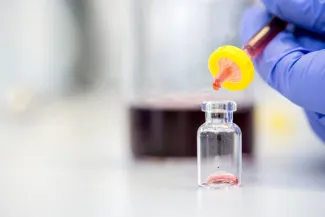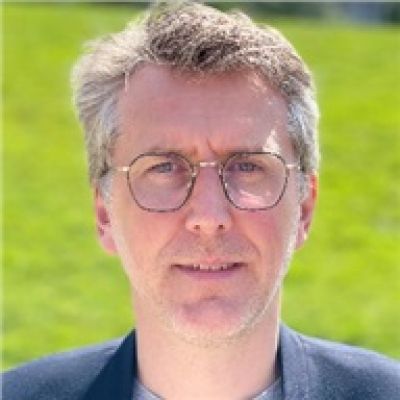Colleague Karl Vrancken coordinated the approach to the PFAS issues in Flanders. An interview.
Professor Karl Vrancken, a research leader at VITO, has been well-known for a long time. He has made a name for himself at VITO and the University of Antwerp as a highly valued international expert in the circular economy. In 2021, he was tasked with coordinating the approach to the PFAS issues in Flanders by the Flemish government. This came as a surprise to many, and as a challenging opportunity for Karl Vrancken.

Did that request surprise you and did it take you a while to think about it?
When the PFAS pollution emerged and the government understood that it was more than a single incident, policy-makers asked a number of people if they knew of any candidates for the role of co-ordinator. My name apparently came up because I do have experience in policy advice, including on waste policy and through the BAT knowledge centre, where there needs to be a link between industry, science and government. I’ve been involved in around 35 BAT studies as a co-ordinator, as well as an author for a number of European BREF documents.
But with no experience of PFAS...
That was exactly what they were looking for: someone with no background in the PFAS issues so they could approach their task with an open mind towards all stakeholders – residents, industry, government. I’m a doctor in chemistry, so I was hardly out of my comfort zone and I’m also a member of the European Environment Agency’s scientific committee. From a circular economy and waste processing perspective, you also need to be familiar with everything to do with toxicology, technology and industrial policy.
Did it take you long to decide?
I didn’t have much time. I got a phone call from the Demir cabinet and the Minister was expecting an answer that same evening. I felt challenged and knew that this was what I wanted to do. But I also knew that this would have consequences for my work at VITO and that I would have to cut my ties with VITO temporarily. So I phoned my unit manager about it right away. We understand each other very well and he assured me that he’d find a solution for the running projects. I also messaged VITO’s CEO. His answer was short and clear: ‘Great! Do it!’ A few hours later, I was looking up everything to do with PFAS. I had exactly 24 hours to prepare myself before they were expecting me at the Council of Ministers.
What characteristics does a good mandate holder need to have?
You need to be able to bring people together, to be able to listen to all parties with an open mind, to be receptive to everyone’s point of view, to be willing to understand everything and to give people a great deal of credit. You also need to be able to learn things quickly, make links and understand. And you need to be prepared to start from square one. That’s the most pleasant part for me – I like to be a pioneer. But the complexity of this topic and the urge to unravel it are also important elements. Moreover, this task is entirely in line with what I’ve been doing at VITO for 25 years: scientifically underpinning policy and creating a science policy interface. This is the task and added value of a knowledge organisation like VITO. We need to weigh in on the social debate. That takes collaboration, exchange, co-creation and collective advancement of knowledge, so there’s a foundation for decision-making.
Did it go the way you expected?
I’d never thought this pollution would be so widespread, across all of Flanders. We began in Zwijndrecht and, a few months later, I was at residents’ meetings all over Flanders. This is not an isolated incident. And I’m still a bit shocked at how the media and politics treat each other day by day. And that we’re sometimes quite far removed from reality in our scientific thinking. I can’t say the problem has been exaggerated, but we’ve got a magnifying glass on PFAS now. The whole PFAS affair is the result of choices that we’ve made as a society. It’s wrong to think you can just implement industry in a living environment. We’re dealing with new pollutants and we can’t estimate how harmful they’re going to be (yet). This is what we at VITO have been arguing for years for: there needs to be a turnaround in the way we produce and consume things. An organic farmer next to an industrial estate?
Will that ever be possible?
We’ll need to make some choices. And we need to strive for a balance. In doing so, we’ll need to take decisions that have an effect on our daily lives, the things we buy and use. We’re really at the limit of what our planet can handle and that’s not just about far-off Amazonian forests – it’s closer, so its also about Zwijndrecht, the port area, etc.
Your mandate will run to December 2022. Will your task be done by then?
In the past year, many people, including VITO colleagues, have done a lot of work on PFAS. We have built up a lot of new knowledge, but various studies are also still ongoing. All these new insights should result in a renewed Flemish PFAS action plan with an adapted consultation structure for the policy on chemical substances. For the area around 3M, there must be a concrete remediation approach, in consultation with all parties. And we need clarified procedures for earthmoving at large shipyards. The government asked me to work on this until December 2022.
Is there anything you'll be bringing to VITO from your experience with PFAS?
A great deal. Mainly, how important VITO’s transition platform is. I really want to do even more with that. Resolving sustainability and climate issues will take a multi-disciplinary approach – it’s impossible for any one person to maintain an overview. You need a structure at the intersection between science and policy. An organisation of experts who can provide the connection. Both scientists and politicians need skills, and training too, in order to achieve this properly. That’s what we aim for.



